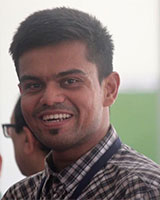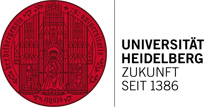“I feel esteemed to be part of this university”

Dr Arnab Muhuri, at present Satellite Earth Observation Scientist at the Institute of Geography of Heidelberg University
Since August 2019 Fellow of the Alexander von Humboldt Foundation at the Institute of Geography of Heidelberg University
When did you arrive in Heidelberg? How long do you plan to stay? What are your goals for your time in Heidelberg?
I arrived in Germany in March 2019. For the initial few months, I was with the Goethe Institut Mannheim undergoing cultural and lingual integration. Post that I moved to Heidelberg in July 2019. At the moment I am hosted as an Alexander von Humboldt Fellow at the Professorship in Hydrology and Climatology, Institute of Geography, Heidelberg University. My research period at Uni Heidelberg will last until the end of July 2021. I am here with a clear objective. Presently my research interests are inclined towards the development of satellite-based Earth observation algorithms for monitoring snow cover in forested environments. This is quite a challenging problem statement in my domain and Black Forest is the perfect place for such investigations. I believe my scientific studies will pave the way for a new line of research for understanding the changing state of seasonal snow precipitation trend over the Black Forest and its collateral economic and social consequences.
Why did you decide in favour of Heidelberg University?
The geographic proximity of the Black Forest and the rich history of Heidelberg University led me to this selection. Moreover, there are very few research publications in my domain with focus over the Black Forest. Furthermore, I feel esteemed to be part of this university which was founded in 1386 and is today Germany’s oldest university and one of the world’s oldest surviving universities. As far as my knowledge goes, 57 Nobel Prize winners have been affiliated with Uni Heidelberg, which makes for more than half of all 84 German Nobel laureates.
What have you learned so far in Heidelberg? What experiences have been particularly valuable?
Apart from my research and development activities I am member of a couple of sports club, or Vereine as they call it in Germany, like TSG Germania 1889 in Dossenheim where I am member of the Badminton team and WHW 1926 e.V. where I practice sailing and play Kanupolo (imagine playing water polo sitting on a kayak) in the river Neckar. And as a public speaker, I am an active member of the Toastmasters Rhetorikclub in Heidelberg where I am able to bring in cultural diversity for my German friends in the form of a speech every other week.
I feel so fortunate to have a life in Heidelberg. It is a dream-come-true experience for me. I have always lived in crowded Indian cities with a population of more than 15 million people and Heidelberg is just around 160,000 people so it's almost like living in a village and yet I am able to bike my way to one of the oldest surviving universities in the world. Sometimes I just walk up to my office. Just to give you an idea of scale, the city where I come from Mumbai (or Bombay), the financial and Bollywood capital of India is just 6 times the area of Heidelberg but with a population of over 18.5 million people. Millions of people in Mumbai don’t have the privilege to walk or even bike to their office since roads can get quite congested during the rush hours and there are no dedicated cycling lanes.
What do you like best about being in Heidelberg? What suggestions would you have for improvements?
Every day when I bike my way to my office, I take a glance at Heidelberg Castle whose foundations were laid before 1214 so that’s how my mornings begin with a glimpse back in time. At times I find time to walk up to the Königstuhl and the view of the sun going down over the Rhein river valley is exhilarating. When I am in search of peace, I go for a stroll at the Heidelberg Bergfriedhof (Mountain Cemetery). And on those days when I have worked too much, I bike down to the Zeughaus-Mensa in Marstall, grab a Hefeweizen and something to eat and I am lucky most of the time to find the table facing the river Neckar. Recently I got invited to the Alte Aula for a musical performance followed by some wine and finger food and I don’t have enough words to describe the beauty of this wooden marvel that the university has preserved. I would love to see Heidelberg retaining its old-world charm even several decades from now.
What is your view of the German scientific system in comparison to that of your home country or to that of other countries where you may have conducted research?
I feel Germany is doing a great service to foreign researchers through bodies like the Alexander von Humboldt Foundation. The German scientific system is quite an inclusive system. I see people from all walks of life here, so the system does not preferentially favour only the economically endowed. This allows the talents sitting right at the bottom end of the economic pyramid to make their way up. The humanitarian, holistic, and unbiased viewpoint of the selection committees in such foundations in Germany inspires researchers to choose Germany as a destination to progress their ongoing research.
Another point worth highlighting is the level of independence and flexibility I possess to drive my research at Uni Heidelberg. I can’t extrapolate that for every individual, but I assume it should be pretty similar since a good work life balance culture is quite prevalent. The concept of mental health and personal time is given a lot of importance in Germany. Things seem to be more relaxed here and move at its own comfortable pace.
In your opinion, what is the importance of international exchanges for students or researchers?
As a student the best thing one can do is to spend possibly a semester at a university abroad. There are several stereotypical thoughts people live with about another country. At times I feel a percentage of the native students in developed nations like Germany don’t value their academic opportunities enough. On the other hand, there are social aspects let’s say a student on an exchange from Germany to India can experience. For example, your supervisor is not just your co-author but also your mentor, your friend, and probably even your family.
What is your opinion of the opportunities made available through the Research Alumni Network? Have you taken advantage of any of these opportunities yet? If yes, please elaborate.
When I joined Heidelberg, I got acquainted with the Research Alumni Network at the university and I learnt about their association with the Alexander von Humboldt Foundation. Furthermore, I got to learn about the Research Ambassador Program and now I am a part of it. This position allows me to promote Heidelberg as a destination for excellence in research and development.
You are Research Alumni Ambassador for Heidelberg as a location of research – what are your experiences and plans?
Over the past several months people are reaching out to me every now and then in order to understand both the research and development and undergraduate possibilities in Germany. I am receiving connection requests from all over the globe. It seems there is a new school of thoughts among people who can see through the haze and identify Germany as their academic destination. Furthermore, I am quite impressed by the omnipresence of the Science Slam culture in Germany. Thus, as a Research Alumni Ambassador, I would like to introduce this format since I believe this is a great way to communicate and improve the outreach of the research and development activities happening at Uni Heidelberg.

